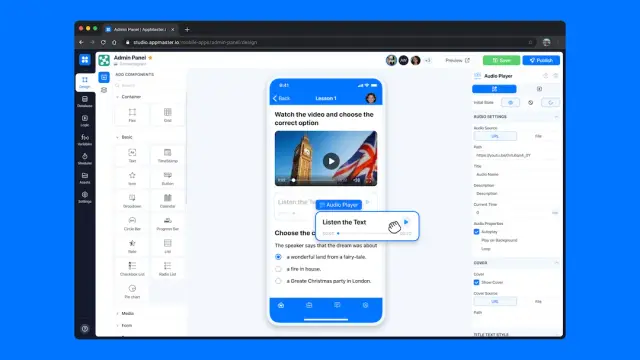Exploring the Security Advantages of PWAs for Your Business
Explore the security advantages of Progressive Web Apps (PWAs) and understand how they can enhance your business operations, protect data, and offer a seamless user experience.

Introduction to Progressive Web Apps
Progressive Web Apps (PWAs) are revolutionizing the way businesses deliver their digital experiences. Combining the best of both web and mobile technologies, PWAs are designed to provide users with a high-performance, responsive, and native app-like experience directly from a web browser. This approach not only simplifies development and deployment but also enhances user interaction, making it a compelling option for businesses aiming to optimize their online presence.
PWAs leverage modern web capabilities to give users a seamless and immersive experience. Unlike traditional mobile applications, which require downloading and updating through an app store, PWAs can be accessed directly via a URL, offering a significant convenience advantage. This results in increased accessibility and reduced friction for users, contributing to greater user engagement and satisfaction.
Adaptability is one of the most standout features of PWAs. As devices with varying screen sizes and capabilities proliferate, the need for applications that can dynamically adjust to different environments becomes crucial. PWAs are built with responsive design principles, ensuring their interface adapts fluidly to any screen size, whether it’s a desktop, tablet, or mobile device.
The implementation of PWAs can potentially transform business operations, streamlining process efficiency while simultaneously boosting reach and interaction. Companies from various industries, including e-commerce, travel, and social media, are already utilizing PWAs to cater to their technologically-savvy customers who expect fast, reliable, and user-friendly digital experiences. With an emphasis on security and efficiency, PWAs can help businesses stay competitive in an ever-evolving tech landscape.
By adopting capabilities like service workers, PWAs allow businesses to offer features traditionally found in native apps, such as offline access and push notifications, alongside the accessibility and broad reach of web apps. This makes PWAs an attractive proposition for businesses looking to deliver high-quality user experiences without the complexity and cost associated with developing and maintaining separate native applications for different platforms.

Security Advantages of PWAs
The integration of Progressive Web Apps (PWAs) into the technological repertoire of businesses is growing. Their ability to offer the seamless, immersive experience of mobile apps while delivering the broadreach and accessibility of web apps is revolutionary. However, beyond their engagement and technical functionalities, PWAs are particularly gaining attention for their security advantages, which are essential to uphold business integrity and protect user data.
HTTPS Protocols: Ensuring Secure Data Exchange
One of the fundamental security features of PWAs is the use of HTTPS protocols. Unlike traditional websites that might still operate over insecure HTTP channels, PWAs are required to be served over HTTPS. This requirement acts as a safeguard, ensuring that data exchanged between the user and the server is encrypted and remains confidential. HTTPS prevents man-in-the-middle attacks, offers secure sessions, and contributes significantly to the trustworthiness of the web application.
Service Workers: Enhancing Resource Security
Service workers are another cornerstone of PWAs that contribute significantly to their security landscape. These scripts operate in the background, independent of the primary application. They cache necessary resources, manage push notifications, and, importantly, allow for the app to function offline. From a security perspective, service workers ensure that data integrity is maintained even with unstable internet connections, preventing loss or tampering of sensitive information. Furthermore, service workers facilitate the execution of asynchronous tasks, reducing the load on the main server and minimizing the chances of denial-of-service (DoS) attacks. By efficiently caching content, PWAs decrease server dependency, offering a high-security standard unavailable in many traditional applications.
Regular Updates and Maintenance
PWAs inherently allow for automatic and seamless updates. This characteristic is vital for security, as it ensures that the application is always running its most up-to-date and secure version. Vulnerabilities and exploits are swiftly addressed, providing a timely response to emerging security threats. In contrast, traditional applications often require users to download and install updates manually, potentially leaving them exposed during the interim.
Isolation from Operating System Vulnerabilities
Unlike native mobile applications that might exploit or fall victim to operating system vulnerabilities, PWAs operate through a web browser. This separation limits the potential for system-wide attacks and ensures a level of isolation from OS-level vulnerabilities. Thus, PWAs can operate securely, without the need for deep integration into the system’s architecture.
User Permissions and Access Controls
The nature of PWAs allows for stringent user permissions and access controls. Since they are accessible via web browsers, PWAs follow robust permissions protocols, such as requesting user consent for access to sensors and data. This consent-driven model adds an extra layer of assurance, empowering users and protecting their personal information.
In conclusion, the security benefits of Progressive Web Apps make them a suitable choice for businesses looking to protect data while providing superior user experiences. As the technological environment continues to evolve, businesses must prioritize security, and PWAs present a forward-thinking solution to meet those demands efficiently.
PWAs vs. Traditional Mobile Apps
The debate between Progressive Web Apps (PWAs) and traditional mobile apps has gained traction owing to the evolving digital landscape. Understanding the key differences and advantages each holds is crucial for businesses aiming to enhance their digital presence.
User Experience
Traditional mobile apps, developed for specific operating systems like iOS and Android, are known for offering a seamless user experience. They utilize the full potential of device features like cameras, GPS, and other hardware capabilities, providing rich, native-like experiences. In contrast, PWAs utilize modern web capabilities, providing an experience that mimics a native app while being accessible through a web browser. With advancements in web standards, PWAs have significantly closed the gap, offering offline capabilities, push notifications, and smooth animations, enhancing user engagement.
Development and Maintenance
Traditional apps require separate code bases for each operating system. This typically leads to higher development costs and increased maintenance efforts, as businesses must release updates for each platform. PWAs, on the other hand, rely on a single code base using standard web technologies such as HTML, CSS, and JavaScript. This unified approach reduces development time and simplifies maintenance, allowing for faster updates and consistent features across all devices.
Accessibility and Reach
Traditional mobile apps are distributed via app stores, which adds a step in downloading and installing before use. While app stores can offer visibility, they also impose fees and lengthy review processes. PWAs bypass these hurdles; they're accessible immediately via a web link, thereby broadening their reach. Users can save PWAs on their home screen without going through an app store, providing ease of access and lowering barriers to entry.
Security
Security is a key consideration for businesses opting for digital solutions. Traditional apps benefit from app store scrutiny, but PWAs have their security strengths. PWAs rely on the HTTPS protocol, ensuring data confidentiality and integrity. Service workers, responsible for caching in PWAs, can operate securely, offering data storage and offline capabilities without exposing sensitive information. This makes PWAs a streamlined option for secure data handling.
Performance
Performance has long been a strength of native apps, thanks to their close integration with device hardware. However, with advancements in web technologies and service workers, PWAs have significantly improved in speed and performance, handling high-load cases effectively.
In conclusion, while traditional mobile apps continue to be a solid choice for specific use cases requiring full access to device hardware or when app store presence is a priority, PWAs emerge as a cost-effective, flexible, and increasingly powerful alternative.
Implementing PWAs in Your Business
Embracing Progressive Web Apps (PWAs) can significantly boost your business by enhancing the user experience and securing your digital presence. Transitioning to PWAs requires a strategic approach to ensure seamless integration with your existing systems and to fully capitalize on their benefits. Here's a comprehensive guide to implement PWAs effectively in your business:
Assess Existing Systems and Infrastructure
Before developing a PWA, it's crucial to thoroughly assess your current web infrastructure and workflows. Evaluate your business objectives, target audience, and the functionalities you want your PWA to feature. Understand the limitations of your current digital solution and identify the main areas where PWAs could excel, such as load speed, offline access, and user engagement.
Develop a PWA Strategy
Crafting a well-structured strategy is pivotal. Consider elements like user interface design, business workflows, critical functionalities, and security concerns. PWAs open up opportunities for personalization and deeper consumer engagement, so consider ways to leverage these capabilities effectively. Engage key stakeholders in the planning process to align on goals and expectations.
Select a Professional Development Platform
Choose a reputable platform or hire experienced developers to construct your PWA. Platforms like AppMaster offer excellent resources and tools for creating web applications without extensive coding. With its visual BP Designer for crafting business logic, and its drag-and-drop interface for UI design, AppMaster is an advantageous option for integrating PWA technology without overbearing costs or technical debt.

Prioritize Security from the Start
Security should be a top priority throughout the development and implementation phases. Employ HTTPS protocols to ensure data integrity and safeguard user information. Service workers, a key component of PWAs, should be configured carefully to manage caching and offline content, ensuring minimal exposure to vulnerabilities. Regular updates and patches are crucial to safeguard against emerging threats and maintain robust security.
Optimize for Performance
Performance optimization is critical for PWAs. A key selling point of PWAs is their instantaneous loading speeds and responsiveness. Utilize tools such as Lighthouse to regularly audit and improve the performance of your PWA. Focus on aspects like image optimization, efficient caching, and JavaScript execution to provide users with a seamless experience regardless of their device or network conditions.
Conduct Thorough Testing
Before launching your PWA, engage in rigorous testing. This process should cover functional, usability, load, and security tests to ensure the PWA performs across various platforms and conditions. Testing under different device scenarios will help fine-tune the user experience, catching areas that may require additional development or adjustments.
Launch and Monitor
Once tests confirm the robustness of your PWA, proceed with a full-scale launch. Ensure your team is prepared to handle user feedback and rapidly address any unforeseen issues that may arise post-launch. Continuous monitoring of your PWA's performance and user engagement metrics is essential to gauge its success and identify potential areas for improvement.
By integrating PWAs into your business strategy, you can offer enhanced security, better performance, and a seamless user experience, all while reducing costs associated with traditional app development.
Future of PWAs and Security
As businesses continue to embrace digital transformation, the role of Progressive Web Apps (PWAs) in ensuring secure and efficient web experiences will undoubtedly expand. The future of PWAs is promising, especially in terms of security and their adaptability to emerging technologies and user demands.
Enhanced Security Protocols
With the increasing complexity of cyber threats, PWAs are expected to adopt more sophisticated security protocols. The use of HTTPS is already a standard feature of PWAs, ensuring encrypted data exchanges and protecting users from malicious activities. In the future, we might see PWAs integrating even more advanced security mechanisms, such as AI-driven anomaly detection to identify and neutralize potential threats proactively.
Integration with Blockchain Technology
Blockchain technology, known for its high-security standards, may become a viable option for PWAs aiming for enhanced data integrity and secure transactions. By adopting blockchain, PWAs can ensure transparent and traceable data records, making them particularly suitable for sectors like finance, healthcare, and supply chain management.
IoT and Edge Computing Synergy
As the Internet of Things (IoT) and edge computing grow, PWAs are uniquely suited to tap into these technologies due to their ability to function across various devices and environments. This synergy will demand higher security standards to protect not just the data, but also the devices interconnected through these networks. PWAs will likely implement edge-based security measures, minimizing risks associated with centralized data storage and processing.
Seamless User Authentication
The future of PWAs includes the integration of more seamless user authentication methods, such as biometric logins and multi-factor authentication (MFA). These advancements will enhance security while providing a frictionless user experience, reducing the likelihood of unauthorized access.
The future of PWAs is intertwined with advancements in security technologies, offering businesses a path to provide their users with safe and reliable digital experiences. As they become more adept at integrating emerging technologies, PWAs will continue to be a valuable asset for businesses looking to enhance their digital presence while safeguarding user data.
FAQ
Progressive Web Apps (PWAs) are web applications that deliver enhanced user experiences by combining capabilities of web and mobile apps, offering offline access, push notifications, and much more.
PWAs are highly secure due to their use of HTTPS, service workers, and regular updates, ensuring data integrity and protection against potential threats.
While PWAs provide many similar features as native apps, some complex applications might still require native functionality. However, for most businesses, PWAs offer a cost-effective and versatile solution.
Key security features include HTTPS protocol to ensure data integrity, service workers that cache data securely, and regular automatic updates to address security vulnerabilities.
PWAs improve business operations by providing a seamless user experience across devices, enhancing engagement, and reducing development and maintenance costs compared to traditional apps.
You can start by assessing your current website needs, consulting with developers or platforms like AppMaster to create a PWA that aligns with your business objectives.
Service workers are scripts that run in the background of PWAs. They manage caching, push notifications, and offline functionality, enhancing both performance and security.
Yes, PWAs can work offline using cached data managed by service workers, ensuring users have access even without an active internet connection.
Future trends include deeper integration with hardware capabilities, improved accessibility features, and expanded use across various industry sectors to enhance user experience.





